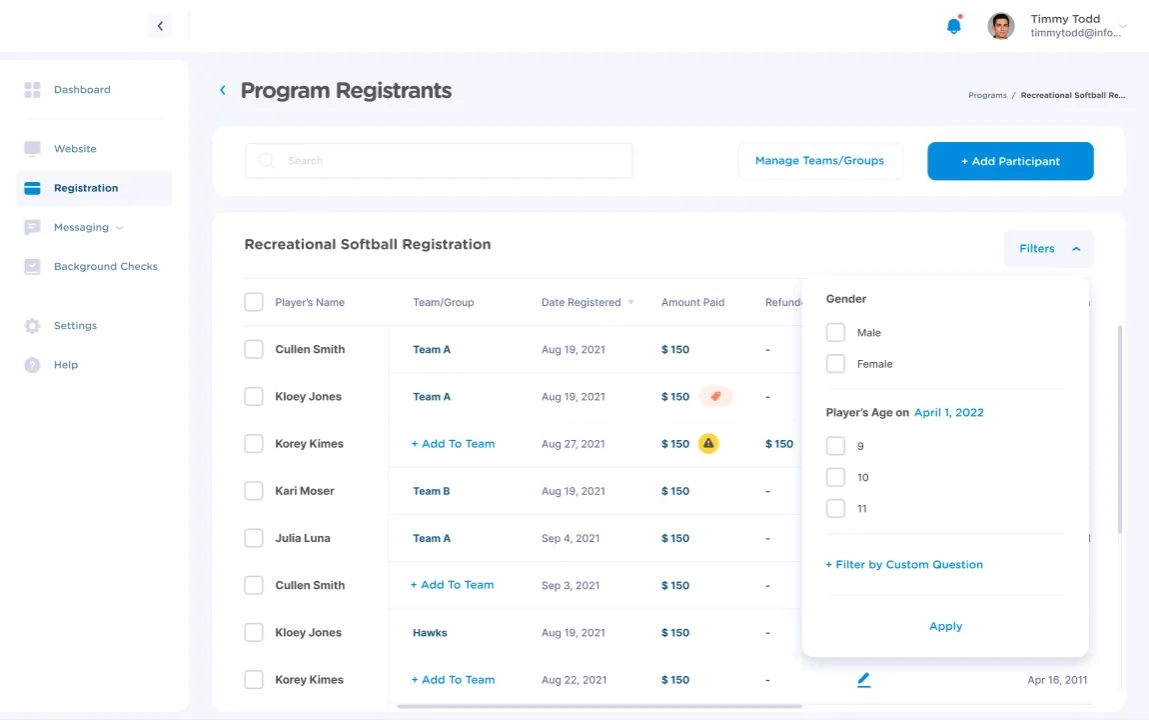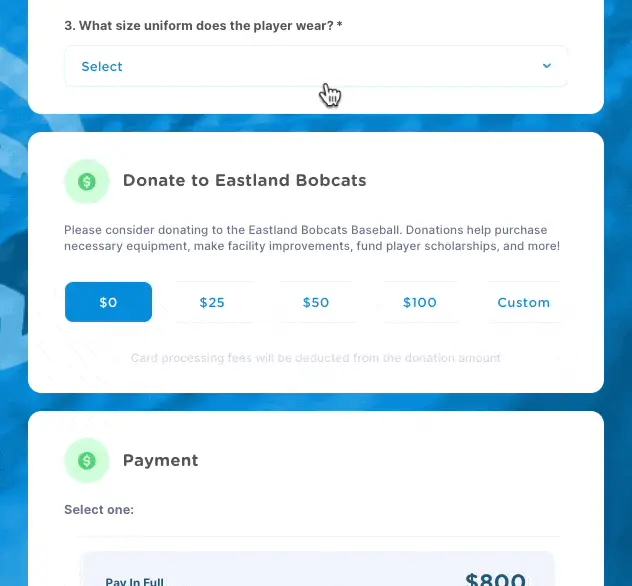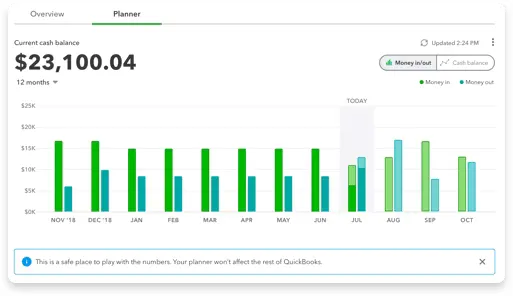
Table of Contents
Keeping track of finances is one of the most important aspects of managing a youth sports league or team. After all, uniforms, equipment, and operating costs can quickly add up, and you must ensure your team sticks to its budget.
Unfortunately, youth sports organizations can't always hire trained accountants, so it's up to you. It's why you're looking for an accounting guide for youth sports teams.
Don't worry, we've got you covered. Learn what's expected of you, how to get started, and some tools you can use to stay on track.
The basics of sports team accounting
Youth sports team accounting refers to managing a sports team or league finances. You might be tasked with creating and maintaining a budget, monitoring and recording income and expenses, or managing sports sponsorships.
Either way, it's your job to make a budget and stick to it—otherwise, you won't be able to afford certain things, or you'll need to rely on additional fundraising.
A volunteer often manages team or club accounting. This may be someone from the league management team, or it may be a parent who has been named team treasurer. Other times, all of this falls on the coach's shoulders.
Tasks that fall under the sports team treasurer or accountant tend to be:
- Creating a budget
- Ordering uniforms
- Collecting dues
- Tracking expenses
- Organizing fundraisers
- Managing the money
Follow along to learn how to manage each task that might fall under your responsibility properly.
How to run accounting for your youth sports team
Whatever your role in the team, you’re likely not an accountant by trade. So you might be wondering what you just got yourself into.
Don’t fret. With this guide, you can put systems in place to help manage your team’s finances. We’ve put together tasks to handle pre-season, during the season, and postseason.
Pre-season
Choose the right accounting software
The first step is choosing the right sports team accounting tool to simplify the process. This can help you collect payments, manage expenses, and monitor the club finances in real time.
A few key features that any suitable bookkeeping software needs—especially for sports clubs—are:
- Online payment processing
- Financial reporting
- Expense tracking
- Budgeting
Here are some tools you might want to consider:
- Jersey Watch: Our all-in-one software enables you to create a website, build out registration pages, accept dues online (via both debit and credit card), manage budgets, and more.
- Quickbooks: This is a standard accounting tool with affordable plans you can use for your sports program.
- MoneyMinder: Take advantage of a cloud-based bookkeeping software made specifically for nonprofits and sports teams that comes with a free version board members will love.
- Sage: An affordable business accounting solution to use for your team management needs, complete with mobile app for on-the-go bookkeeping.

Managing your payments and registration is easy with Jersey Watch
Put together a budget
Once you’ve chosen the best accounting software for your needs, you’ll need to assemble a team budget. This can help you plan potential expenses and determine the cost for team members to join.
Start by listing out all of the expenses your team will likely face. These may include:
- Uniforms
- Sports equipment
- Facility maintenance
- Travel/bus fees
- Concessions
- Software
- Referee fees
- Background checks
- Year-end awards
- Parties and other rewards
Once you know the expenses, you can divide it by the number of players you estimate signing up. This will give you an idea of what you must charge for a registration fee. If the number seems too high to be a reasonable expectation from parents, look into additional fundraising options.
Collect team dues
After you know how much you’ll need to charge each player for registration fees, launch and promote your league website so you can start collecting dues. Some leagues only accept checks in person, but if you can accept payments online, you can make it even easier on parents.
Jersey Watch lets you accept payments (and donations!) right on your sports website. It’s a simple workflow:
- Design customized registration forms that participants or their guardians can fill out.
- Embed payment options within the registration forms, allowing users to pay directly while signing up.
- Share the registration forms with participants through email, social media, or your league’s website.

💡TIP: Open a small business bank account to help keep all money in one, easy-to-track place.
Put together a fundraising plan
If you need additional funds beyond what registration fees can provide, you’ll want to create a fundraising plan for your team. There are several ways to fundraise to bring in more money for your league expenses.
A few ideas include:
- Accept donations on your team website
- Sell merch, food, or other items
- Offer sponsorships or sell ad space on your site
- Hold a car wash or bake sale
- Auction off donated items
- Sell concessions at games
Choose your fundraiser(s) and start planning them out. It’s a good idea to let parents know what will be expected of them and the players so they can plan accordingly.
During the season
Monitor all money in and out
Once the season starts, your job as an accountant will be fully underway. You’ll need to pay attention to the expenses and ensure that nothing that was unexpected or unaccounted for in the budget pops up.

QuickBooks lets you easily track cash flow for your organization.
Furthermore, keep an eye on money coming in to make sure you’re getting all dues and fundraised money that you should be. Ensure you’re always in the green and that all expenses are fully covered.
Communicate finances
Be transparent about the finances, communicating with coaches, parents, and others involved in the league about how much things will cost, if there are extra funds for any additional team rewards, or if more fundraisers need to be held.
This will also include sending reminders when parents still owe dues and communicating with higher-ups in the league about the state of your team’s finances.
Postseason
Make a plan for remaining money
If there is any leftover money at the end of the season, plan how to deal with it. You may even choose to have a vote amongst league managers and/or parents.
A few options include:
- Refunding the money evenly to parents
- Rolling leftover funds over to the next season
- Holding an end-of-season party
- Purchasing medals or trophies
Ensure everyone is on the same page about the plan for any leftover funds so there’s no unfairness or animosity.
Create a financial report
Finally, you’ll want to create a financial report showcasing the cash flow throughout the season. Share total income, total expenses, and what all incoming money was spent on to ensure no discrepancies.
As team treasurer, you may also create reports throughout the season, showcasing that you haven’t overspent and that the sports management team doesn’t need to get involved in securing dues from parents.
Once you’ve created a final report, your role as an accountant has likely finished up. And unless you’re on the docket to take over the finances again when the next season rolls around, you can hang up your numbers apron and pat yourself on the back for a job well done.
Get started with youth sports team accounting the right way
Help your youth sports team or league make the most of their finances. If you’re looking for the right tools to use, consider Jersey Watch. We can help you build your registration page, accept online payments, and work with other accounting software to give you an overview of your team's finances.
Youth sports team accounting FAQs
How do you set up a bank account for your youth sports team?
The league will need to file paperwork in order to get an EIN (employer identification number). You can then use this number to open a business bank account specifically for your sports league’s financial management.
How do you budget for youth sports?
Consider all of the potential expenses you’ll have. Uniforms, equipment, facility rentals, and the like. Pool those expenses together to see the potential total cost. Add in a margin of error, then use that number to decide what you need to charge new players for joining, how many sponsorships you need to secure, or if there is any additional fundraising your league will need to do.
What skills do you need for youth sports accounting?
Youth sports team accounting isn’t usually a trained skill. However, if you’re good with numbers or money, you might be a good candidate for helping out your local team’s finances.
What does a youth sports treasurer do?
A youth sports treasurer has a number of tasks. They create a budget, collect payments, manage cash flow, monitor expenses, and set pricing for the league.